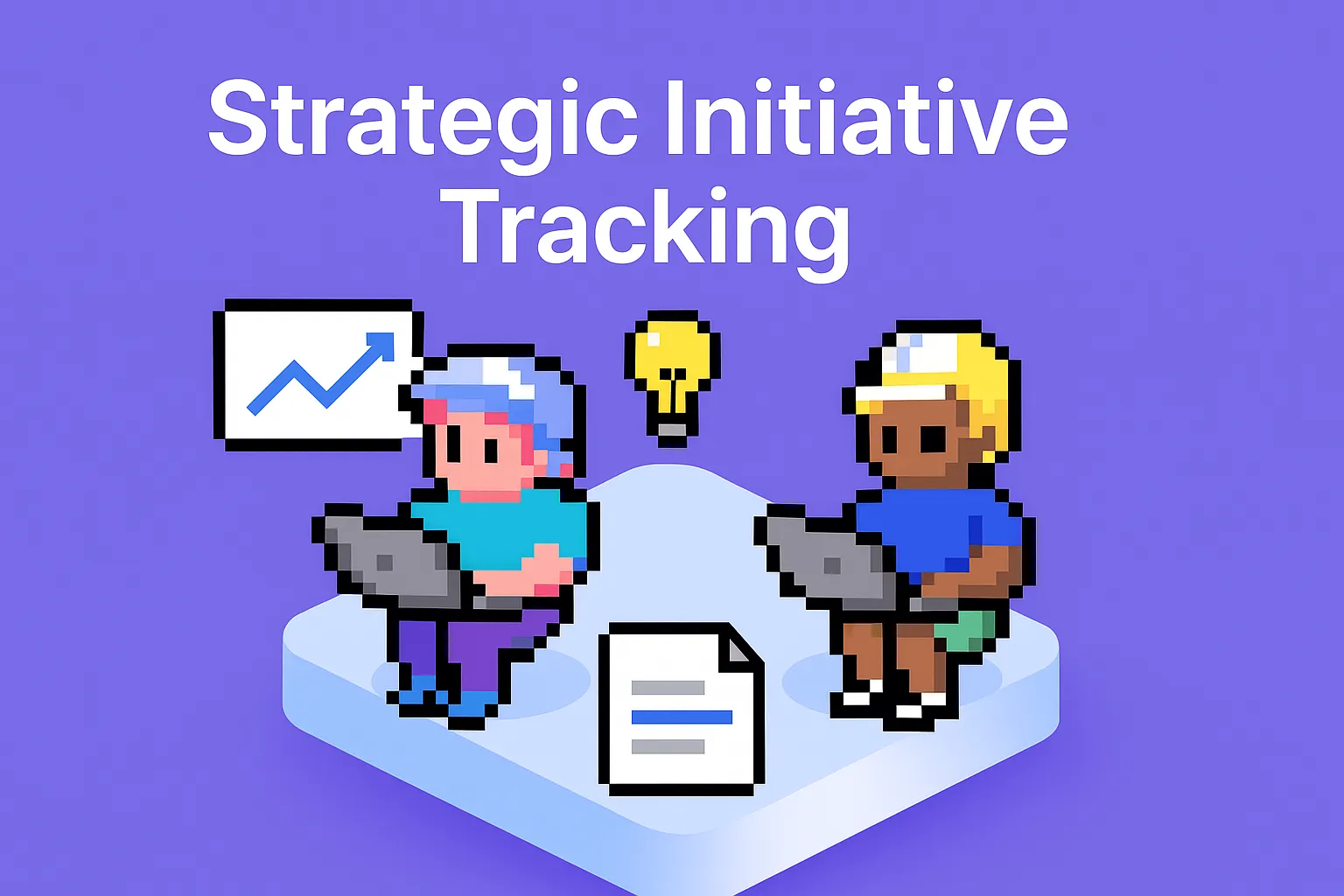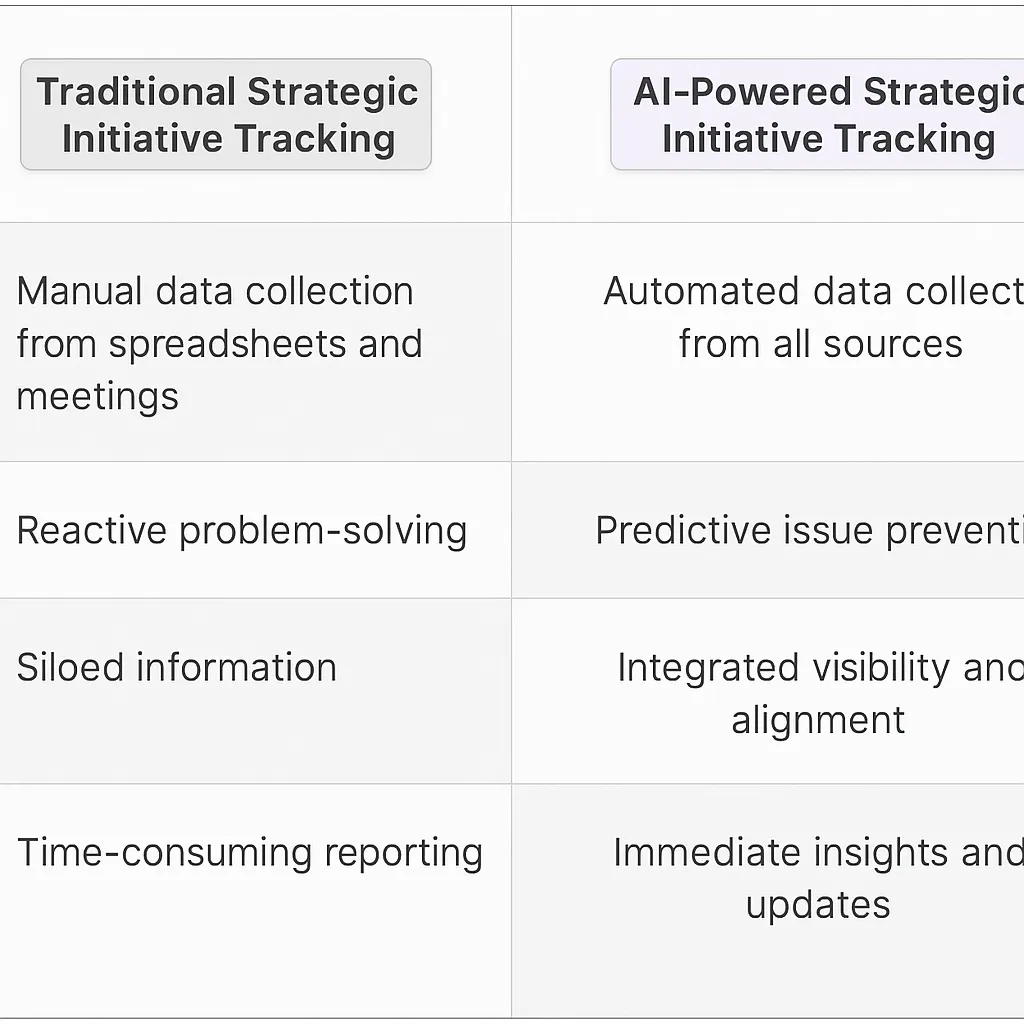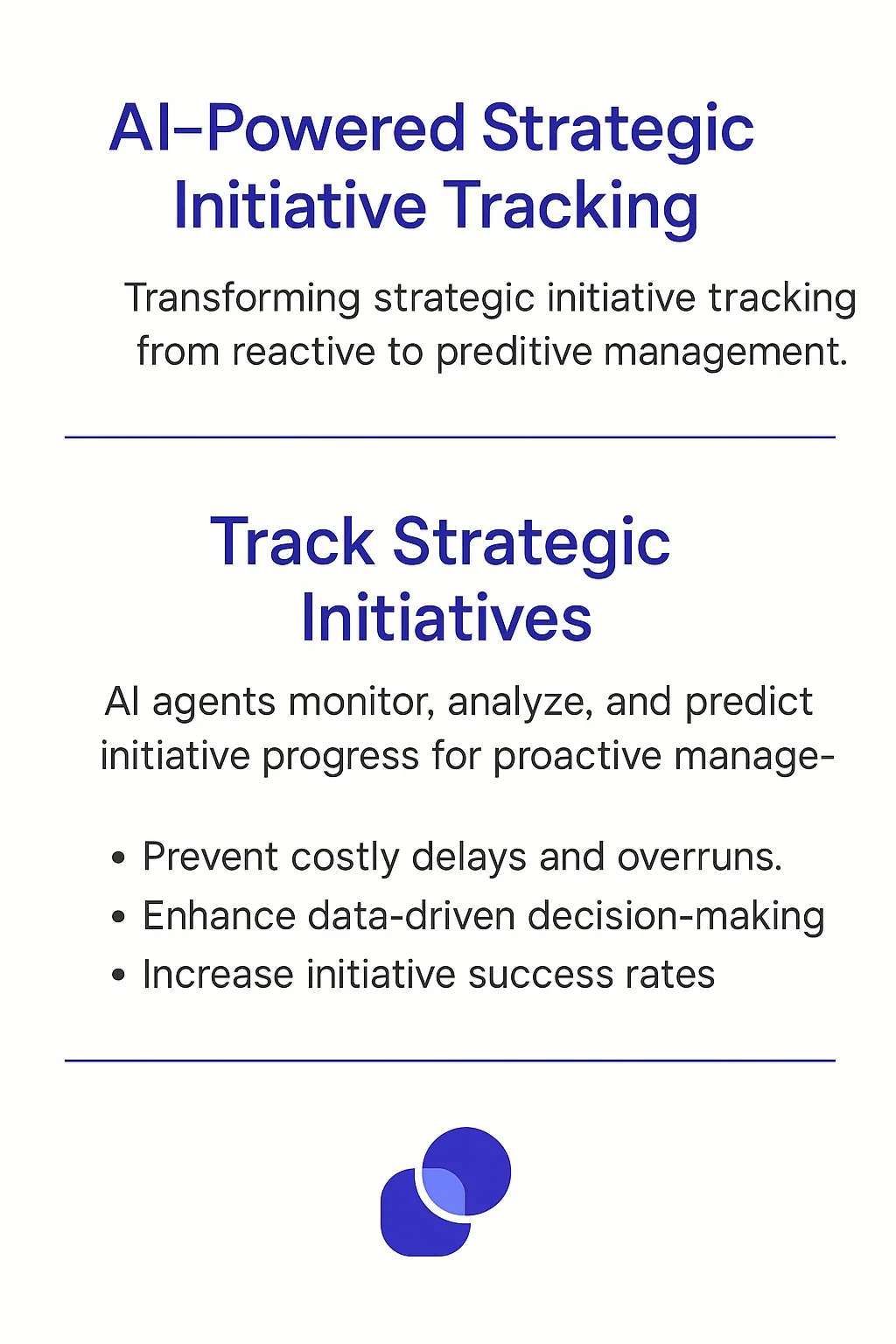Strategic Initiative Tracking AI Agents
Understanding Strategic Initiative Tracking and AI Agents
What is Strategic Initiative Tracking?
Strategic Initiative Tracking is the process of monitoring, measuring, and managing an organization's key projects and programs that are critical to achieving its long-term goals. It's the GPS for your company's most important journeys, helping you navigate from grand vision to tangible results. This process involves collecting data, analyzing progress, identifying risks and opportunities, and making informed decisions to keep initiatives on track.
Key Features of Strategic Initiative Tracking
Effective Strategic Initiative Tracking typically includes:1. Real-time monitoring of key performance indicators (KPIs)2. Progress visualization through dashboards and reports3. Risk assessment and mitigation planning4. Resource allocation and optimization5. Stakeholder communication and alignment6. Predictive analytics to forecast potential issues7. Cross-functional collaboration tools8. Adaptive planning capabilities to respond to changesWhen powered by AI agents, these features become supercharged, offering unprecedented levels of insight and agility in executing strategic initiatives.

Benefits of AI Agents for Strategic Initiative Tracking
What would have been used before AI Agents?
Before AI agents entered the scene, tracking strategic initiatives was like trying to herd cats while juggling flaming torches. Companies relied on a mishmash of spreadsheets, project management tools, and endless status meetings. It was a world of manual data entry, siloed information, and insights that arrived too late to be actionable.
Project managers spent more time chasing updates than actually managing. Executives were left squinting at dashboards, trying to decipher if their grand plans were on track or careening off a cliff. The whole process was about as efficient as using a butter knife to cut down a redwood.
What are the benefits of AI Agents?
Enter AI agents for strategic initiative tracking, and suddenly it's like we've upgraded from a horse-drawn carriage to a Tesla. These digital teammates are the secret sauce that turns initiative tracking from a necessary evil into a competitive advantage.
First off, AI agents are data vacuum cleaners on steroids. They suck up information from every corner of your organization, from Slack messages to Git commits, creating a real-time, holistic view of your initiatives. No more waiting for Bob in accounting to update his spreadsheet.
But here's where it gets really interesting: these AI agents don't just collect data, they make sense of it. They're like having a team of McKinsey consultants working 24/7, but without the hefty price tag and PowerPoint addiction. They spot patterns, identify bottlenecks, and surface insights that humans might miss.
The real game-changer is predictive analytics. AI agents can forecast potential roadblocks and delays before they happen. It's like having a crystal ball for your projects, minus the smoke and mirrors. This proactive approach means you're no longer playing whack-a-mole with problems; you're preventing them before they pop up.
And let's talk about the decision-making superpower these AI agents bestow upon leaders. They serve up actionable insights tailored to each stakeholder. Executives get high-level strategic views, while project managers see granular, day-to-day details. It's like having a personalized Bloomberg terminal for your initiatives.
The bottom line? AI agents for strategic initiative tracking aren't just improving an existing process; they're fundamentally changing how organizations execute strategy. They're turning strategic initiatives from a game of chance into a science, giving companies the ability to move faster, pivot smarter, and win bigger in today's hyper-competitive landscape.

Potential Use Cases of AI Agents with Strategic Initiative Tracking
Processes
Strategic initiative tracking is a critical process for organizations aiming to execute their long-term vision. AI agents can significantly enhance this process, offering a level of insight and efficiency that's hard to match with human effort alone. Let's dive into some key use cases:
- Real-time progress monitoring: AI agents can continuously scan project management tools, communication channels, and data repositories to provide up-to-the-minute insights on initiative progress. This eliminates the need for manual status updates and ensures leadership always has the latest information at their fingertips.
- Predictive analysis: By analyzing historical data and current trends, AI agents can forecast potential roadblocks or delays in strategic initiatives. This foresight allows teams to proactively address issues before they derail progress.
- Resource optimization: AI agents can track resource allocation across various initiatives, identifying areas of over or under-utilization. This enables organizations to make data-driven decisions about where to allocate their human and financial capital for maximum impact.
- Cross-functional alignment: Strategic initiatives often span multiple departments. AI agents can monitor communication and collaboration patterns, flagging potential silos or misalignments that could hinder progress.
Tasks
Breaking down the strategic initiative tracking process, there are several specific tasks where AI agents can provide substantial value:
- KPI tracking and visualization: AI agents can automatically collect data from various sources, calculate key performance indicators (KPIs), and generate visually compelling dashboards. This task, which often takes hours of manual work, can be completed in seconds.
- Meeting summarization and action item extraction: AI agents can attend strategy review meetings, transcribe discussions, summarize key points, and extract action items. This ensures that critical decisions and next steps are captured and communicated effectively.
- Stakeholder updates: Based on predefined rules and the latest data, AI agents can draft personalized updates for different stakeholder groups. This ensures consistent communication without burdening project leads with repetitive reporting tasks.
- Risk assessment: By analyzing project data and external factors, AI agents can continuously assess and update risk profiles for each strategic initiative. This dynamic risk management approach allows for more agile and responsive strategy execution.
- Initiative interdependency mapping: Large organizations often have multiple strategic initiatives running concurrently. AI agents can map out dependencies between these initiatives, highlighting potential conflicts or synergies that humans might overlook.
The integration of AI agents into strategic initiative tracking isn't just about automation - it's about augmenting human capabilities. These digital teammates can handle the heavy lifting of data collection and analysis, freeing up strategists and executives to focus on high-level decision-making and creative problem-solving.
As organizations continue to grapple with increasing complexity and rapid change, the ability to execute strategic initiatives effectively will become an even more critical differentiator. AI agents offer a powerful tool to enhance this capability, providing the real-time insights and predictive power needed to navigate an uncertain future.
The key to success will be finding the right balance between AI capabilities and human judgment. Organizations that can effectively blend the analytical power of AI with the strategic thinking of their leadership teams will be well-positioned to turn their long-term visions into reality.

Industry Use Cases for Strategic Initiative Tracking AI Agents
The versatility of AI agents in strategic initiative tracking makes them valuable across various industries. Let's dive into some meaty, industry-specific use cases that showcase how AI can transform workflows and processes in ways you might not have considered.
These digital teammates aren't just fancy to-do lists or glorified project management tools. They're like having a team of hyper-focused, never-sleeping analysts who can crunch data, spot patterns, and surface insights that humans might miss. And they do it all without needing coffee breaks or complaining about the office temperature.
What's particularly exciting is how these AI agents can adapt to the unique challenges and rhythms of different sectors. They're not one-size-fits-all solutions, but rather chameleons that can speak the language of finance one minute and healthcare the next. This adaptability is crucial because let's face it, tracking strategic initiatives in a fast-moving tech startup is a whole different ball game compared to doing the same in a heavily regulated industry like banking.
So, let's roll up our sleeves and explore how these AI agents are making waves across various industries. You might just find yourself wondering how you ever managed without them.
Retail's AI-Powered Strategic Initiative Tracking Revolution
The retail industry is ripe for disruption, and Strategic Initiative Tracking AI Agents are poised to be the game-changers. Let's dive into how these digital teammates could transform the way retail giants execute their grand plans.
Consider a major retailer like Target or Walmart. They're constantly juggling multiple strategic initiatives - from expanding their e-commerce presence to revamping their supply chain. Traditionally, tracking these initiatives has been a nightmare of spreadsheets, endless meetings, and data silos. Enter the AI agent.
These AI-powered trackers can tap into various data sources across the organization - sales figures, inventory levels, customer feedback, even social media sentiment. They're not just passive data aggregators; they're proactive analysts that can spot trends, flag potential issues, and even suggest course corrections in real-time.
Imagine a scenario where Target is rolling out a new private label clothing line. The AI agent could simultaneously monitor production timelines, track inventory distribution across stores, analyze early sales data, and gauge customer reactions on social media. It could alert executives if certain styles are underperforming in specific regions or if there's a sudden spike in positive mentions on Instagram.
But here's where it gets really interesting. These AI agents can learn and adapt over time. They start to understand the nuances of retail strategy, the seasonal patterns, the impact of external factors like economic trends or competitor actions. They become increasingly sophisticated in their analysis and recommendations.
The result? Retail executives can make faster, more informed decisions. They can pivot strategies quickly based on real-time data, not gut feelings or outdated reports. It's like having a team of expert analysts working 24/7, but with the added benefit of machine learning and predictive capabilities.
This isn't just about efficiency; it's about competitive advantage. In the cutthroat world of retail, the ability to execute strategic initiatives more effectively could be the difference between thriving and merely surviving. And as these AI agents become more sophisticated, they could even start suggesting new strategic initiatives based on emerging trends and opportunities.
The retail landscape is about to get a lot more interesting. Those who embrace these AI-powered strategic initiative trackers might just find themselves leading the pack in this new era of data-driven retail strategy.
Manufacturing's AI-Driven Strategic Initiative Tracking Transformation
The manufacturing sector is on the cusp of a major shift, and Strategic Initiative Tracking AI Agents are the catalysts. These digital teammates are set to redefine how manufacturing giants execute their ambitious plans, turning strategy into tangible results.
Take a behemoth like Boeing or Toyota. They're constantly juggling complex, multi-year initiatives - from developing next-gen electric vehicles to optimizing global supply chains. Historically, tracking these initiatives has been a mess of disconnected systems, time-consuming status meetings, and gut-feel decision making. The AI agent changes this game entirely.
These AI trackers are data vacuum cleaners on steroids. They suck in information from every corner of the organization - production metrics, quality control data, supplier performance, R&D progress, even employee feedback. But they're not just data hoarders. They're sharp analysts that can identify bottlenecks, predict delays, and even propose solutions in real-time.
Let's zoom in on Toyota's hypothetical initiative to launch a fleet of autonomous vehicles. The AI agent could simultaneously monitor progress across multiple dimensions - battery tech development, software integration timelines, regulatory compliance, test drive results, and public perception. It could flag if the AI driving system is underperforming in certain weather conditions or if there's an unexpected surge in positive mentions from beta testers.
The real magic, though, is in the learning. These AI agents aren't static tools - they're evolving entities. They start to grasp the intricacies of manufacturing strategy, the impact of geopolitical events on supply chains, the ripple effects of new technologies. Over time, their analysis becomes more nuanced, their predictions more accurate.
For manufacturing execs, this is like having a team of seasoned strategists and analysts working round the clock, but with superhuman data processing capabilities and zero biases. They can course-correct strategies based on hard data and predictive insights, not just intuition or quarterly reports.
This isn't just about operational efficiency - it's about staying ahead in a brutally competitive global market. In manufacturing, where margins are tight and innovation cycles are getting shorter, the ability to execute strategic initiatives more effectively could be the difference between market leadership and obsolescence.
As these AI agents mature, they might even start proposing new strategic initiatives based on emerging technologies or shifting market dynamics. Imagine an AI that suggests pivoting to green hydrogen production based on its analysis of energy trends, regulatory changes, and your company's core competencies.
The manufacturing world is about to get a lot more dynamic. Those who embrace these AI-powered strategic initiative trackers won't just be playing the game better - they'll be changing the rules entirely. Welcome to the era of AI-driven manufacturing strategy.
Considerations
Technical Challenges
Implementing a Strategic Initiative Tracking AI Agent isn't a walk in the park. It's more like trying to teach a robot to play 4D chess while riding a unicycle. The first hurdle? Data integration. Your AI needs to slurp up data from every nook and cranny of your organization - CRMs, project management tools, financial systems, you name it. It's like trying to get all your apps to play nice in one sandbox, but some of them are determined to build their own castles.
Then there's the machine learning model itself. Training it to understand the nuances of strategic initiatives is like teaching a newborn to differentiate between Picasso and Pollock. It needs to grok complex business concepts, recognize patterns in seemingly unrelated data points, and make predictions that don't sound like they came from a magic 8-ball. And let's not forget about keeping this model up-to-date. Business landscapes shift faster than San Francisco rent prices, so your AI needs to be agile enough to keep up.
Operational Challenges
On the operational front, you're looking at a whole new can of worms. First up: the human factor. Introducing an AI to track strategic initiatives is like bringing a Martian to a board meeting. There's bound to be some culture shock. You'll need to convince your team that this digital teammate isn't here to replace them, but to make their lives easier. It's like trying to sell kale smoothies to a team that's been surviving on coffee and donuts.
Then there's the question of governance. Who's responsible when the AI makes a call that turns out to be as wrong as Juicero? You need to establish clear protocols for decision-making, error handling, and accountability. It's like setting up a prenup for your AI - not the most romantic part of the process, but absolutely crucial.
Lastly, there's the ongoing maintenance and optimization. Your AI is like a high-performance sports car - it needs regular tune-ups to keep running smoothly. You'll need a dedicated team to monitor its performance, tweak its algorithms, and make sure it's not going off the rails. It's a bit like having a temperamental pet that requires constant attention, except this one can potentially tank your company's strategic direction if it starts misbehaving.
The Future of Strategy Execution: AI-Powered and Data-Driven
Strategic Initiative Tracking AI Agents are not just another tech fad - they're the future of how organizations will execute their most critical projects. By combining the power of machine learning with the complexities of strategic planning, these digital teammates are enabling a level of insight, agility, and execution that was previously unimaginable.The impact of these AI agents extends far beyond just improving efficiency. They're fundamentally changing how organizations approach strategy execution, turning it from an art into a science. From retail to manufacturing, industries are discovering that these AI-powered tools can be the difference between market leadership and obsolescence.However, implementing these systems isn't without challenges. From technical hurdles like data integration to operational issues like change management, organizations will need to navigate carefully to reap the full benefits.Despite these challenges, the potential rewards are too significant to ignore. As these AI agents continue to evolve and learn, they'll become increasingly sophisticated in their analysis and recommendations. We're moving towards a future where AI doesn't just track strategic initiatives, but actively shapes them.For forward-thinking leaders, the question isn't whether to adopt these technologies, but how quickly they can integrate them into their strategic processes. Those who successfully harness the power of Strategic Initiative Tracking AI Agents will find themselves with a powerful ally in the relentless pursuit of their long-term vision. The future of strategy execution is here, and it's powered by AI.












